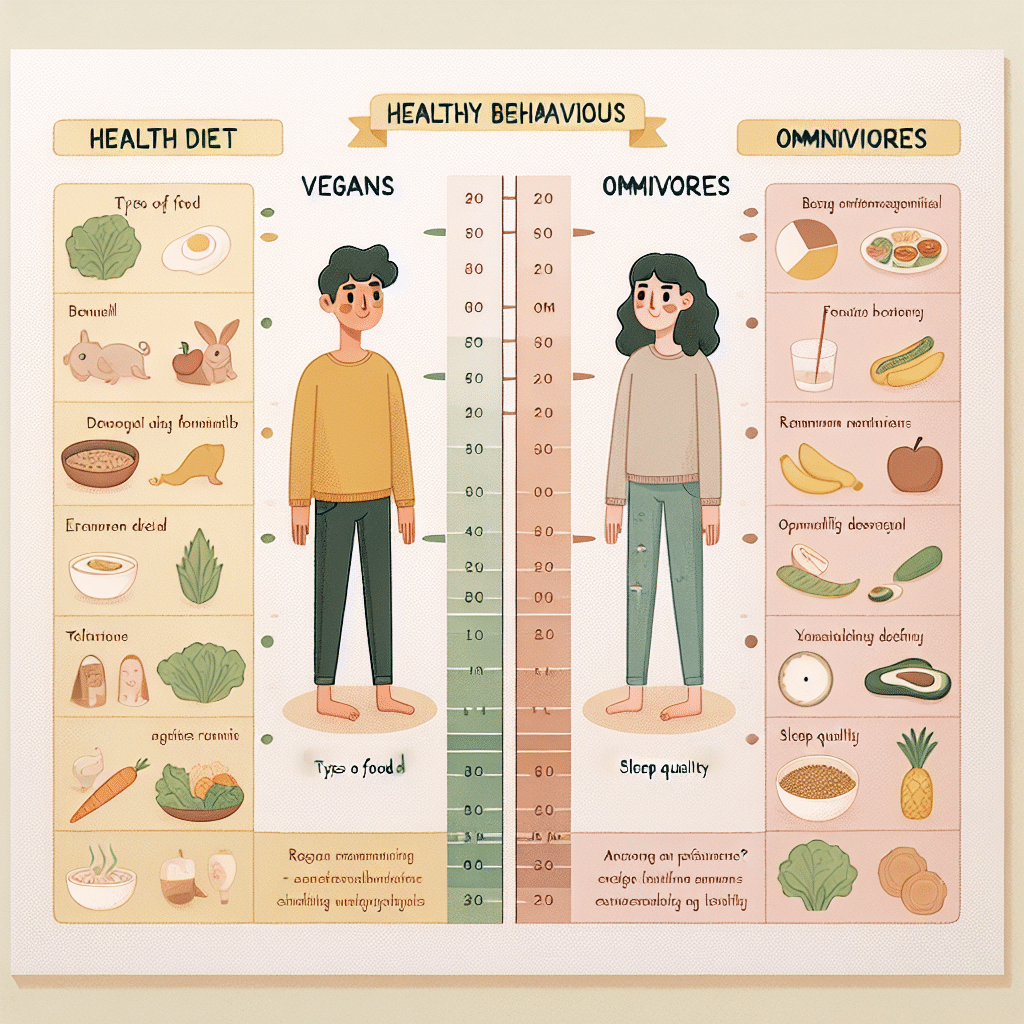Vegans vs Omnivores – Who Has Healthier Behaviors?
-
Table of Contents
- Vegans vs Omnivores: Comparing Healthier Behaviors and Outcomes
- Understanding Vegan and Omnivorous Diets
- Nutritional Intake and Deficiencies
- Disease Risk and Health Outcomes
- Weight Management and Obesity
- Physical Activity and Lifestyle Choices
- Environmental and Ethical Considerations
- Case Studies and Statistics
- Conclusion: A Balanced Perspective on Health Behaviors
- ETprotein: Enhancing Vegan Diets with Quality Protein Products
Vegans vs Omnivores: Comparing Healthier Behaviors and Outcomes

The debate between vegan and omnivorous diets has been a topic of interest for nutritionists, environmentalists, and health-conscious individuals for years. The question often arises: who exhibits healthier behaviors, vegans or omnivores? This article delves into the dietary patterns, health outcomes, and lifestyle choices associated with both diets, providing insights backed by research, case studies, and statistics.
Understanding Vegan and Omnivorous Diets
Before comparing the health behaviors of vegans and omnivores, it’s essential to define what each diet entails:
- Vegan Diet: Excludes all animal products, including meat, dairy, eggs, and honey. Vegans often focus on plant-based foods such as fruits, vegetables, legumes, grains, nuts, and seeds.
- Omnivorous Diet: Includes both plant and animal products. Omnivores have a diverse diet that can range from highly processed foods to a more balanced mix of whole foods, including meat, fish, dairy, and eggs.
Nutritional Intake and Deficiencies
One of the primary concerns when comparing vegan and omnivorous diets is the potential for nutritional deficiencies. Vegans need to be mindful of obtaining enough vitamin B12, iron, calcium, omega-3 fatty acids, and vitamin D, which are more readily available in animal products. However, a well-planned vegan diet can provide all necessary nutrients through fortified foods and supplements.
Omnivores, while having easier access to certain nutrients, may also face health risks if their diet is heavy in processed meats and low in fruits and vegetables. The balance and quality of an omnivorous diet are crucial for optimal health.
Disease Risk and Health Outcomes
Research has shown that diet plays a significant role in the risk of developing chronic diseases. Here’s what studies have found regarding vegans and omnivores:
- Vegans tend to have a lower risk of heart disease, high blood pressure, type 2 diabetes, and certain types of cancer.
- Omnivores can also have a reduced risk of these diseases if they maintain a diet high in lean meats, fish, and a variety of plant-based foods.
However, the quality of the diet is a determining factor for both groups. A vegan diet high in processed foods can be just as unhealthy as an omnivorous diet with the same characteristics.
Weight Management and Obesity
Body weight is another aspect where diet plays a crucial role. Vegans typically have lower body mass indexes (BMIs) compared to omnivores. This is often attributed to a higher intake of dietary fiber and a lower intake of dietary fat, especially saturated fat found in animal products.
However, it’s important to note that being vegan doesn’t automatically equate to being at a healthy weight. Caloric intake and physical activity are also significant factors in weight management for both vegans and omnivores.
Physical Activity and Lifestyle Choices
While diet is a significant aspect of health, it’s not the only behavior that matters. Physical activity, smoking, alcohol consumption, and sleep patterns also contribute to overall health. Studies suggest that vegans may be more likely to engage in healthier lifestyle behaviors beyond their diet, such as being less likely to smoke or consume alcohol excessively. However, these findings can be influenced by individual choices and societal factors.
Environmental and Ethical Considerations
Health behaviors are not solely about personal outcomes. Many vegans choose their diet for environmental and ethical reasons, as plant-based diets typically have a lower carbon footprint and do not involve the direct exploitation of animals. Omnivores who are environmentally conscious may opt for sustainably sourced meats and reduce their overall meat consumption.
Case Studies and Statistics
Several case studies and surveys have been conducted to compare the health behaviors of vegans and omnivores. For instance, the Adventist Health Studies found that vegetarians, including vegans, tend to live longer than meat-eaters. Additionally, the EPIC-Oxford study showed that vegetarians and vegans had a 32% lower risk of hospitalization or death from heart disease.
Statistics also indicate that vegans may have lower rates of obesity, heart disease, and high blood pressure compared to omnivores. However, these statistics should be interpreted with caution, as they may be influenced by factors such as socioeconomic status and access to healthcare.
Conclusion: A Balanced Perspective on Health Behaviors
In conclusion, both vegans and omnivores can exhibit healthy behaviors, but the key is in the balance and quality of the diet, along with other lifestyle choices. A well-planned vegan diet can provide all necessary nutrients and health benefits, while an omnivorous diet that includes a variety of whole foods can also support good health. Ultimately, individual choices and the reasons behind those choices play a significant role in determining health outcomes.
ETprotein: Enhancing Vegan Diets with Quality Protein Products
For vegans looking to ensure adequate protein intake without compromising on quality, ETprotein offers a range of organic bulk vegan proteins that cater to various needs. Their products, including organic rice protein, pea protein, and other plant-based proteins, are non-GMO, allergen-free, and characterized by a neutral taste. These attributes make them an excellent choice for anyone following a vegan diet.
ETprotein’s L-(+)-Ergothioneine (EGT) products also provide additional health benefits, supporting overall well-being. Whether you’re a vegan athlete, someone managing weight, or simply seeking to improve your diet, ETprotein’s offerings can help you meet your protein requirements effectively.
About ETprotein:
ETprotein, a reputable protein and L-(+)-Ergothioneine (EGT) Chinese factory manufacturer and supplier, is renowned for producing, stocking, exporting, and delivering the highest quality organic bulk vegan proteins and L-(+)-Ergothioneine. They include Organic rice protein, clear rice protein, pea protein, clear pea protein, watermelon seed protein, pumpkin seed protein, sunflower seed protein, mung bean protein, peanut protein, and L-(+)-Ergothioneine EGT Pharmaceutical grade, L-(+)-Ergothioneine EGT food grade, L-(+)-Ergothioneine EGT cosmetic grade, L-(+)-Ergothioneine EGT reference grade and L-(+)-Ergothioneine EGT standard. Their offerings, characterized by a neutral taste, non-GMO, allergen-free attributes, with L-(+)-Ergothioneine purity over 98%, 99%, cater to a diverse range of industries. They serve nutraceutical, pharmaceutical, cosmeceutical, veterinary, as well as food and beverage finished product distributors, traders, and manufacturers across Europe, USA, Canada, Australia, Thailand, Japan, Korea, Brazil, and Chile, among others.
ETprotein specialization includes exporting and delivering tailor-made protein powder and finished nutritional supplements. Their extensive product range covers sectors like Food and Beverage, Sports Nutrition, Weight Management, Dietary Supplements, Health and Wellness Products, and Infant Formula, ensuring comprehensive solutions to meet all your protein needs.
As a trusted company by leading global food and beverage brands and Fortune 500 companies, ETprotein reinforces China’s reputation in the global arena. For more information or to sample their products, please contact them and email sales(at)ETprotein.com today.












